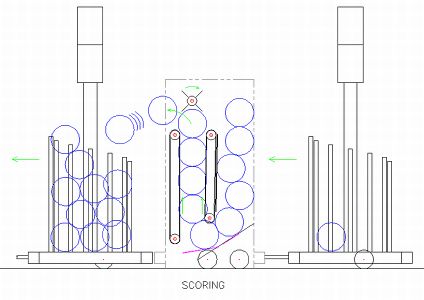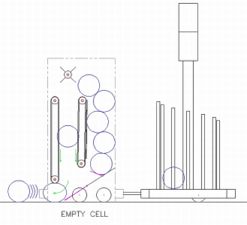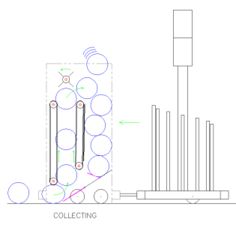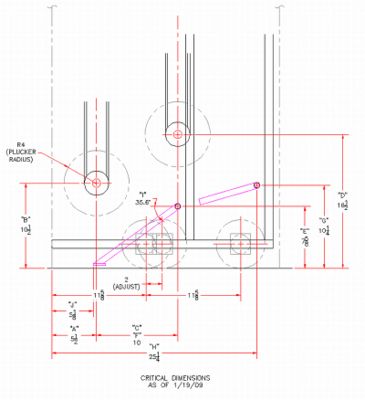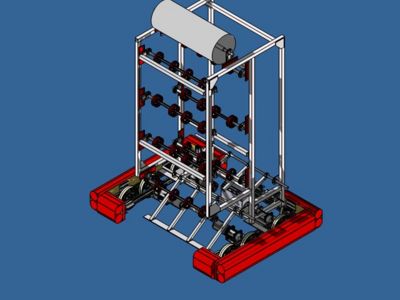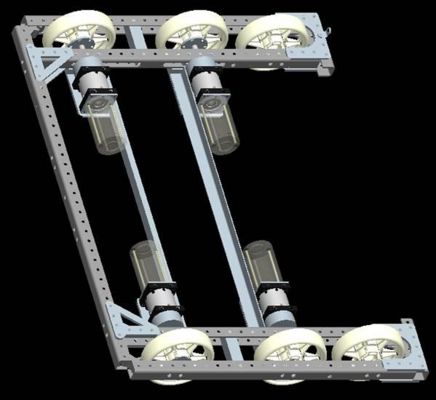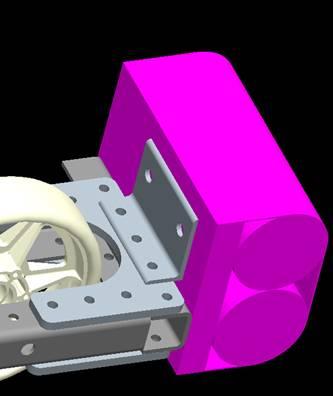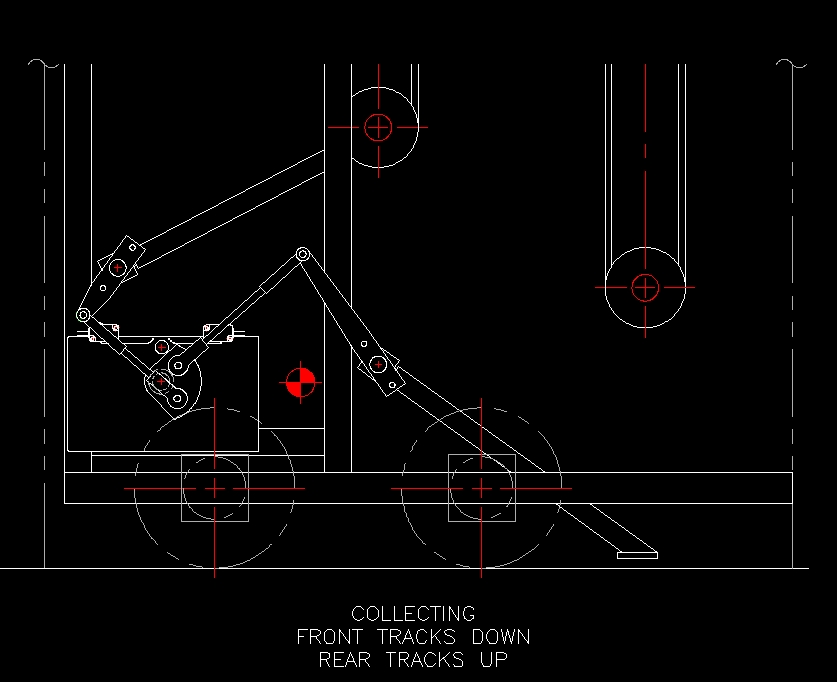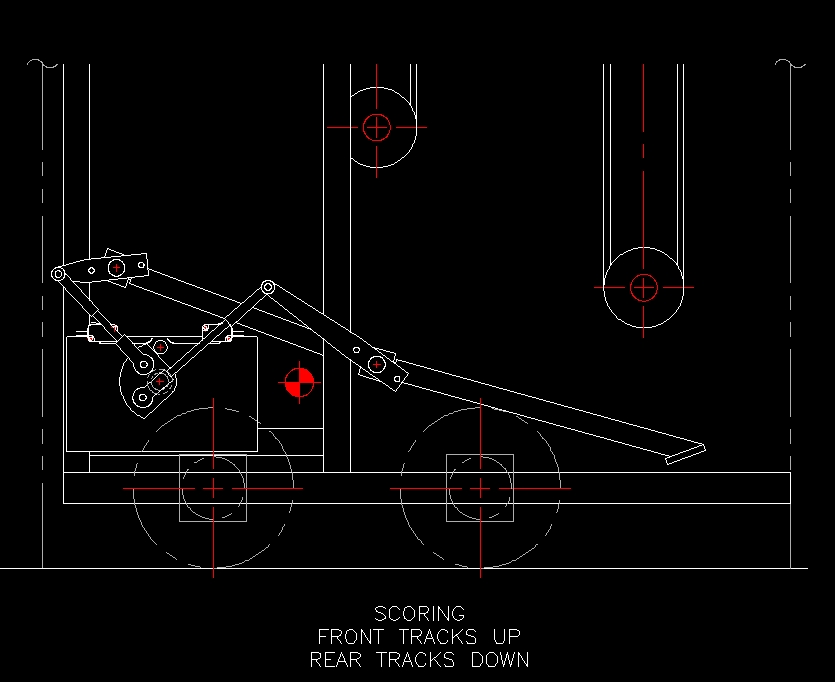2009:Robot Design Details: Difference between revisions
From 1511Wookiee
Jump to navigationJump to search
Leadership (talk | contribs) (changed motor) |
m (Robot Design Details moved to 2009:Robot Design Details) |
(No difference)
| |
Latest revision as of 11:50, 4 January 2010
Main Robot Design
General layout design of the robot, Dimensions ARE NOT exact.
Drivetrain
- 4-wheel drive(6 if needed)
- Four Banebots 12:1 Transmissions
- Four 2.5" CIM motors
- Victor 884 [Drive] Speed Controllers
- Fixed wheels (slip-style steering)
- Banebots encoders on each wheel (http://banebots.com/pc/ELECTRONICS/EN-G0561-KT) -- mounted at transmission outputs.
- 27.25” LONG x 37.25” WIDE
- Rear wheel axis at 5.625 from most rear surfaces (adjustable down to 4.625 corner brace regime permitting)
- Front wheel axis at 11.625 from front most surfaces (adjustable ± 2.00”)
- Using 3/8" bolts to mount bumpers to the frame. See drawing below for bumper mount details.
- Spacers used will be copper pipe cut to the correct length to space wheels on the axel.
- 6 hole patterns in the wheels need to be tapped for 10-32 screws 3/4" deep
- No stiffener element between the wheels seems to be needed.
- Trailer hitch is assembled from KOP items.
- Determination of need to mount dummy wheels will occur once the top portion of the robot is assembled.
- Dummy wheels will be supported using 3/8" bolt, length TBD.
- Bearings will be inserted in the dummy wheels from the kit of parts.
Front Ball Entry/Exit
- Ball intake/expulsion power provided by "chicken pluckers" on front conveyor - see conveyor.
- Passage controlled by "door" (TBD - need details)
- Front opening dimensions (TBD)
- Powered by same motor, speed controller as ball hopper trap door (see below).
- Two Limit Switches to tell when door is in open/closed position
Ball Hopper
- Open top entry for human player introduction
- Entry from conveyor at top of robot; entry controlled by upper ejector
- Exit is a "trap door" at the bottom of the hopper down to the area behind the lower ball collector and at the base of the conveyor system.
- Trap door powered by Nippon Denso Window motor (along with lower collection blocker)
- Two Limit Switches to tell when door is in open/closed position
- Jaguar speed controller
Ball Conveyor
- Two conveyors opposite each other, working together to move balls from ball intake and/or below the ball hopper up to the upper ball ejector/hopper entry point.
- Front conveyor also acts as collector to bring outside balls in via "chicken pluckers" on lower roller of conveyor
- Powered by two independent motors (Fischer Price** motors with 25:1 reduction gearboxes) **Changed from RS-545
- Likely NOT direct drive, will likey be chain/sprocket to save space and move weight back on robot
- Banner Sensors (photoelectric): Q10RP6R Reciever and Q106E Source Mounted at the top of conveyor to detect ball "ready to fire"
- 2 Omron photoelectric sensors arranged with a small wheel used to determine conveyor speed. One disk/sensor per conveyor.
- Jaguar speed controller
Upper Ball Ejector
- Spinning ejector directs, based on direction, balls out of robot or in to hopper entry point.
- Powered by RS-545 Banebots** motor with plastic gearbox removed and 25:1 reduction gearbox added (same Banebots units as on conveyor drives) ** changed from Fischer Price
- Will be chain/sprocket to save space and move weight back on robot, and to allow optimization of ejector speed without loss of motor power
- Shaft encoder sensor (E7P-180-375-S-H-G-3) to monitor rotational speed (180 CPR). Requires 3/8" shaft. If we can't get E7P in time, we may have to use E4P model which requires 1/4" shaft
- Jaguar speed controller
